Leadership and Management CW1: The Workplace Project Report
VerifiedAdded on 2021/04/16
|17
|4238
|23
Report
AI Summary
This report, titled "Leadership and Management CW1: The Workplace Project Report," analyzes leadership principles and practices within the context of The Fairmont Dubai. It begins with a biography of the general manager, Mr. Ammar Hilal, and includes interview questions that provide insights into his leadership style, responsibilities, and responses to industry challenges. The report defines leadership, outlines leadership traits, and explores leadership theories, with a specific focus on their application within the hospitality industry. It examines the leader's development path, identifying key characteristics such as innovation, vision, inner values, inspiration, and communication. Furthermore, it discusses the influence of heredity and environmental factors on leadership development. The report concludes with recommendations for enhancing leadership dynamics and promoting sustainable growth within the organization, making it a valuable resource for understanding effective leadership in the hospitality sector.
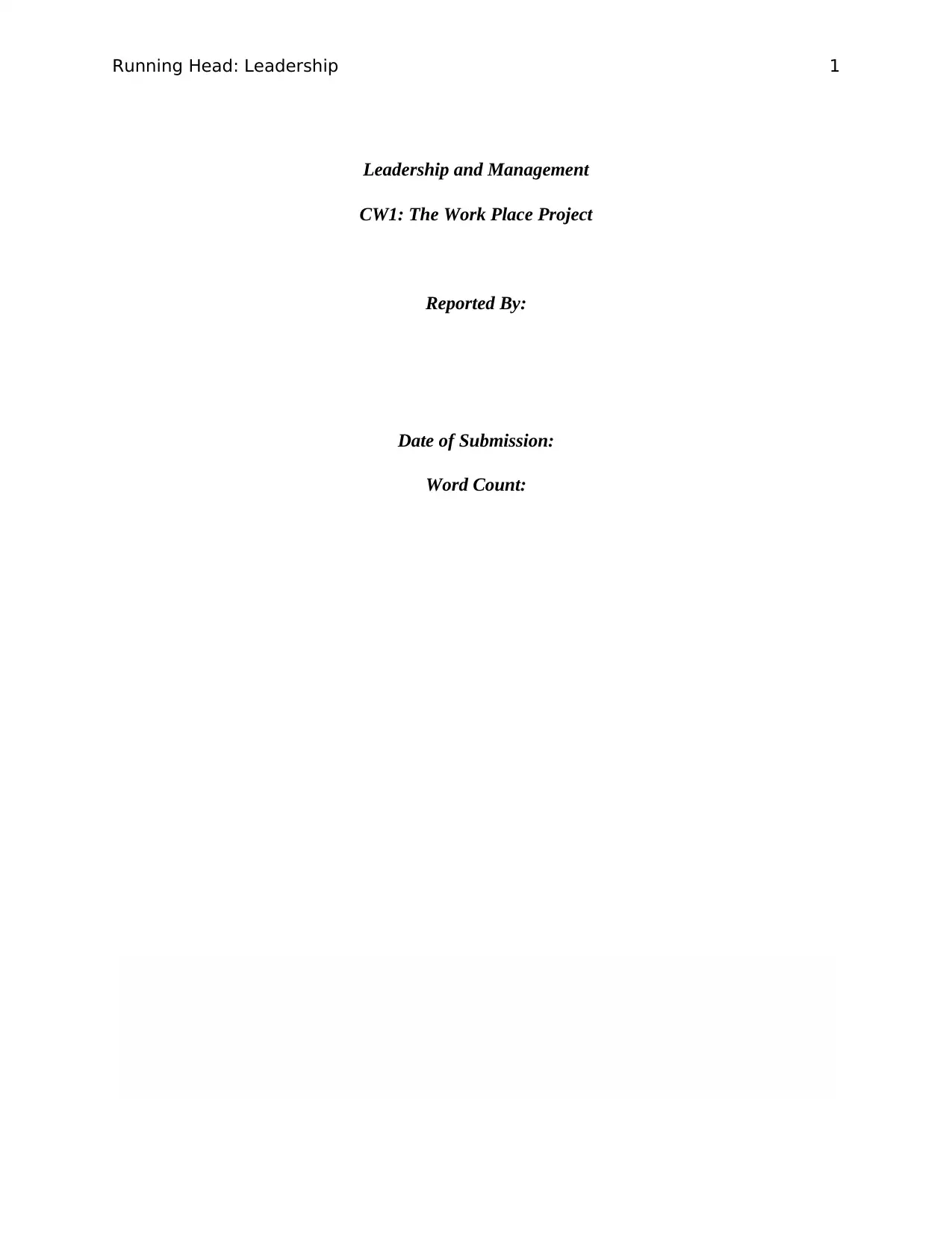
Running Head: Leadership 1
Leadership and Management
CW1: The Work Place Project
Reported By:
Date of Submission:
Word Count:
Leadership and Management
CW1: The Work Place Project
Reported By:
Date of Submission:
Word Count:
Paraphrase This Document
Need a fresh take? Get an instant paraphrase of this document with our AI Paraphraser
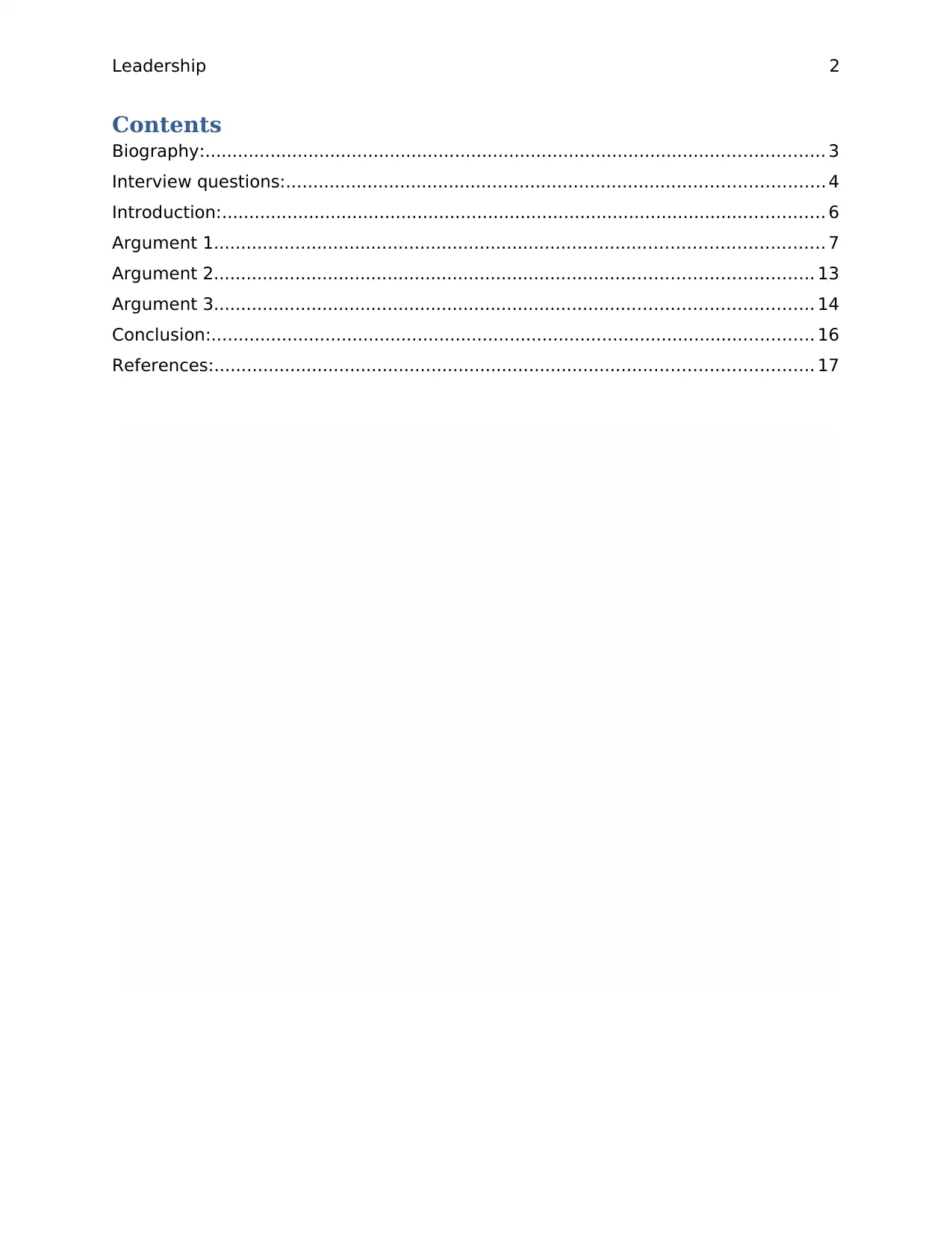
Leadership 2
Contents
Biography:.................................................................................................................. 3
Interview questions:................................................................................................... 4
Introduction:............................................................................................................... 6
Argument 1................................................................................................................ 7
Argument 2.............................................................................................................. 13
Argument 3.............................................................................................................. 14
Conclusion:............................................................................................................... 16
References:.............................................................................................................. 17
Contents
Biography:.................................................................................................................. 3
Interview questions:................................................................................................... 4
Introduction:............................................................................................................... 6
Argument 1................................................................................................................ 7
Argument 2.............................................................................................................. 13
Argument 3.............................................................................................................. 14
Conclusion:............................................................................................................... 16
References:.............................................................................................................. 17
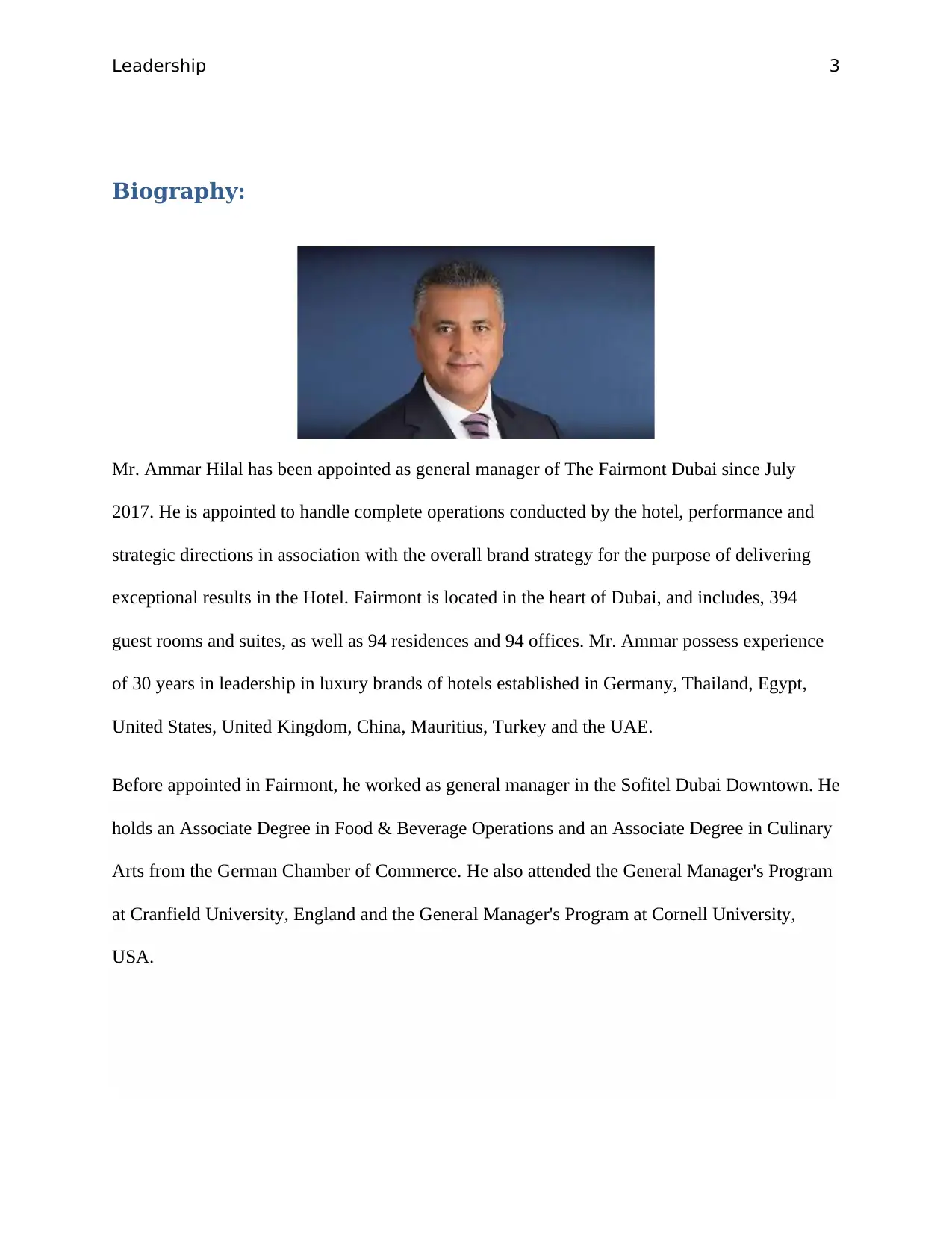
Leadership 3
Biography:
Mr. Ammar Hilal has been appointed as general manager of The Fairmont Dubai since July
2017. He is appointed to handle complete operations conducted by the hotel, performance and
strategic directions in association with the overall brand strategy for the purpose of delivering
exceptional results in the Hotel. Fairmont is located in the heart of Dubai, and includes, 394
guest rooms and suites, as well as 94 residences and 94 offices. Mr. Ammar possess experience
of 30 years in leadership in luxury brands of hotels established in Germany, Thailand, Egypt,
United States, United Kingdom, China, Mauritius, Turkey and the UAE.
Before appointed in Fairmont, he worked as general manager in the Sofitel Dubai Downtown. He
holds an Associate Degree in Food & Beverage Operations and an Associate Degree in Culinary
Arts from the German Chamber of Commerce. He also attended the General Manager's Program
at Cranfield University, England and the General Manager's Program at Cornell University,
USA.
Biography:
Mr. Ammar Hilal has been appointed as general manager of The Fairmont Dubai since July
2017. He is appointed to handle complete operations conducted by the hotel, performance and
strategic directions in association with the overall brand strategy for the purpose of delivering
exceptional results in the Hotel. Fairmont is located in the heart of Dubai, and includes, 394
guest rooms and suites, as well as 94 residences and 94 offices. Mr. Ammar possess experience
of 30 years in leadership in luxury brands of hotels established in Germany, Thailand, Egypt,
United States, United Kingdom, China, Mauritius, Turkey and the UAE.
Before appointed in Fairmont, he worked as general manager in the Sofitel Dubai Downtown. He
holds an Associate Degree in Food & Beverage Operations and an Associate Degree in Culinary
Arts from the German Chamber of Commerce. He also attended the General Manager's Program
at Cranfield University, England and the General Manager's Program at Cornell University,
USA.
⊘ This is a preview!⊘
Do you want full access?
Subscribe today to unlock all pages.

Trusted by 1+ million students worldwide
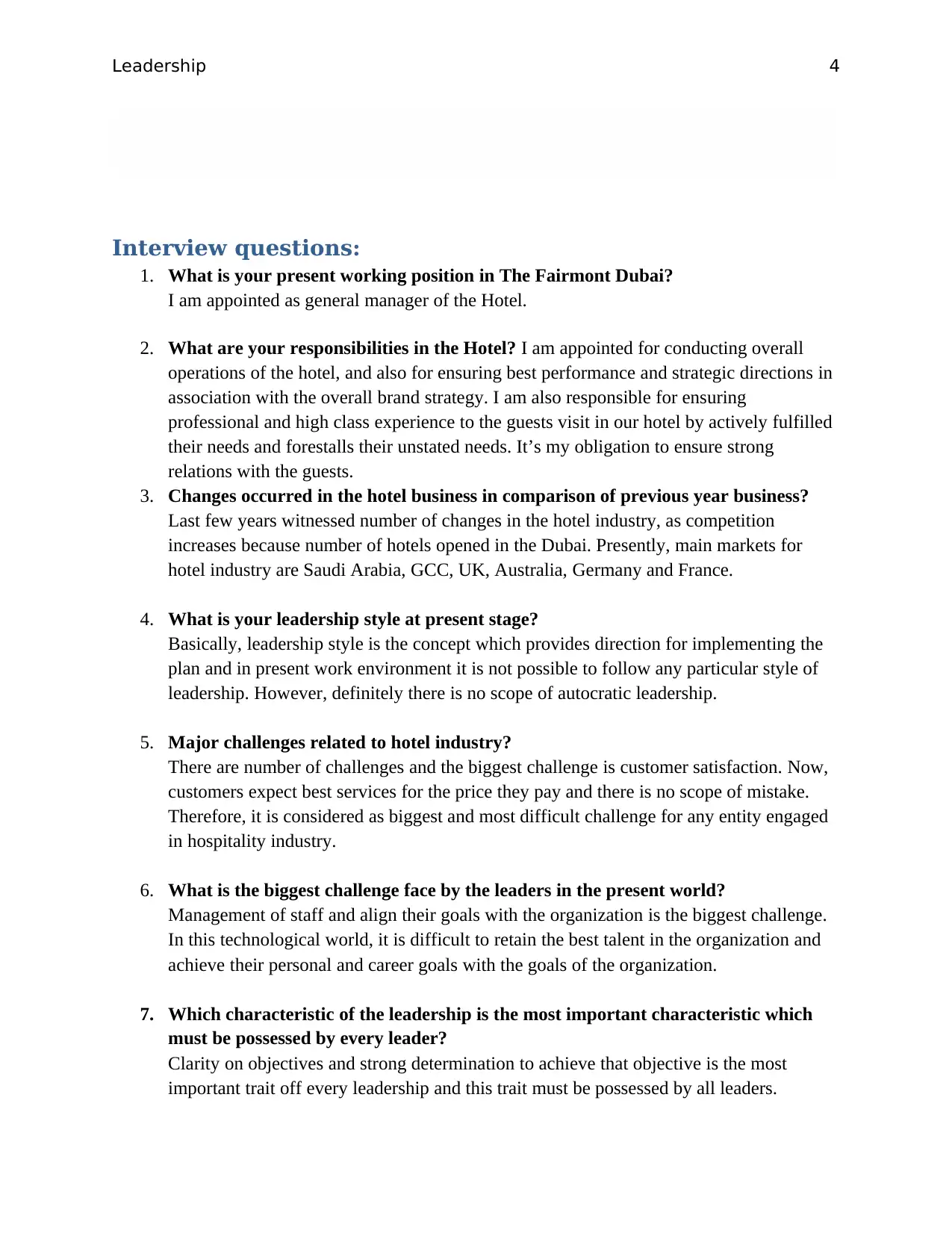
Leadership 4
Interview questions:
1. What is your present working position in The Fairmont Dubai?
I am appointed as general manager of the Hotel.
2. What are your responsibilities in the Hotel? I am appointed for conducting overall
operations of the hotel, and also for ensuring best performance and strategic directions in
association with the overall brand strategy. I am also responsible for ensuring
professional and high class experience to the guests visit in our hotel by actively fulfilled
their needs and forestalls their unstated needs. It’s my obligation to ensure strong
relations with the guests.
3. Changes occurred in the hotel business in comparison of previous year business?
Last few years witnessed number of changes in the hotel industry, as competition
increases because number of hotels opened in the Dubai. Presently, main markets for
hotel industry are Saudi Arabia, GCC, UK, Australia, Germany and France.
4. What is your leadership style at present stage?
Basically, leadership style is the concept which provides direction for implementing the
plan and in present work environment it is not possible to follow any particular style of
leadership. However, definitely there is no scope of autocratic leadership.
5. Major challenges related to hotel industry?
There are number of challenges and the biggest challenge is customer satisfaction. Now,
customers expect best services for the price they pay and there is no scope of mistake.
Therefore, it is considered as biggest and most difficult challenge for any entity engaged
in hospitality industry.
6. What is the biggest challenge face by the leaders in the present world?
Management of staff and align their goals with the organization is the biggest challenge.
In this technological world, it is difficult to retain the best talent in the organization and
achieve their personal and career goals with the goals of the organization.
7. Which characteristic of the leadership is the most important characteristic which
must be possessed by every leader?
Clarity on objectives and strong determination to achieve that objective is the most
important trait off every leadership and this trait must be possessed by all leaders.
Interview questions:
1. What is your present working position in The Fairmont Dubai?
I am appointed as general manager of the Hotel.
2. What are your responsibilities in the Hotel? I am appointed for conducting overall
operations of the hotel, and also for ensuring best performance and strategic directions in
association with the overall brand strategy. I am also responsible for ensuring
professional and high class experience to the guests visit in our hotel by actively fulfilled
their needs and forestalls their unstated needs. It’s my obligation to ensure strong
relations with the guests.
3. Changes occurred in the hotel business in comparison of previous year business?
Last few years witnessed number of changes in the hotel industry, as competition
increases because number of hotels opened in the Dubai. Presently, main markets for
hotel industry are Saudi Arabia, GCC, UK, Australia, Germany and France.
4. What is your leadership style at present stage?
Basically, leadership style is the concept which provides direction for implementing the
plan and in present work environment it is not possible to follow any particular style of
leadership. However, definitely there is no scope of autocratic leadership.
5. Major challenges related to hotel industry?
There are number of challenges and the biggest challenge is customer satisfaction. Now,
customers expect best services for the price they pay and there is no scope of mistake.
Therefore, it is considered as biggest and most difficult challenge for any entity engaged
in hospitality industry.
6. What is the biggest challenge face by the leaders in the present world?
Management of staff and align their goals with the organization is the biggest challenge.
In this technological world, it is difficult to retain the best talent in the organization and
achieve their personal and career goals with the goals of the organization.
7. Which characteristic of the leadership is the most important characteristic which
must be possessed by every leader?
Clarity on objectives and strong determination to achieve that objective is the most
important trait off every leadership and this trait must be possessed by all leaders.
Paraphrase This Document
Need a fresh take? Get an instant paraphrase of this document with our AI Paraphraser
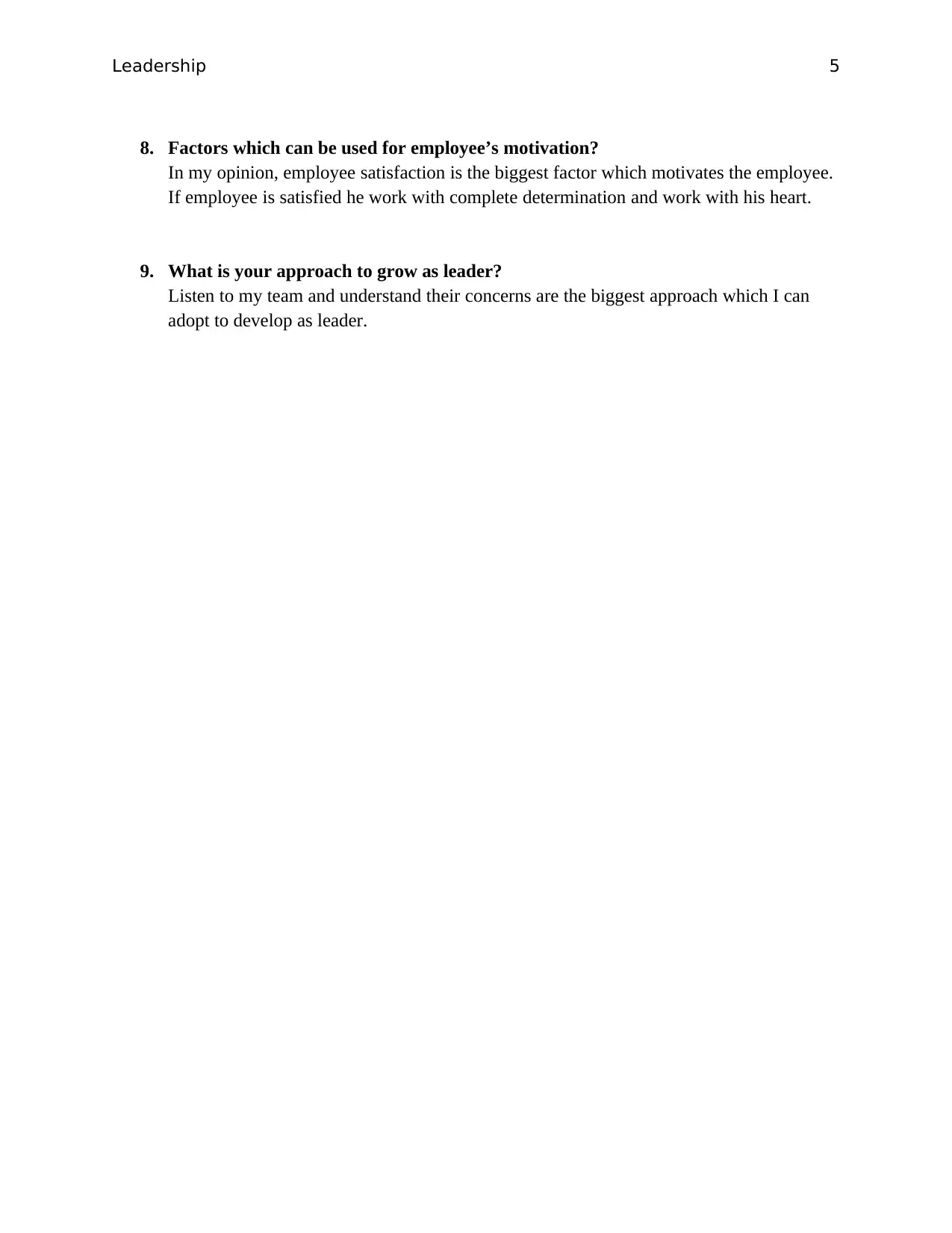
Leadership 5
8. Factors which can be used for employee’s motivation?
In my opinion, employee satisfaction is the biggest factor which motivates the employee.
If employee is satisfied he work with complete determination and work with his heart.
9. What is your approach to grow as leader?
Listen to my team and understand their concerns are the biggest approach which I can
adopt to develop as leader.
8. Factors which can be used for employee’s motivation?
In my opinion, employee satisfaction is the biggest factor which motivates the employee.
If employee is satisfied he work with complete determination and work with his heart.
9. What is your approach to grow as leader?
Listen to my team and understand their concerns are the biggest approach which I can
adopt to develop as leader.
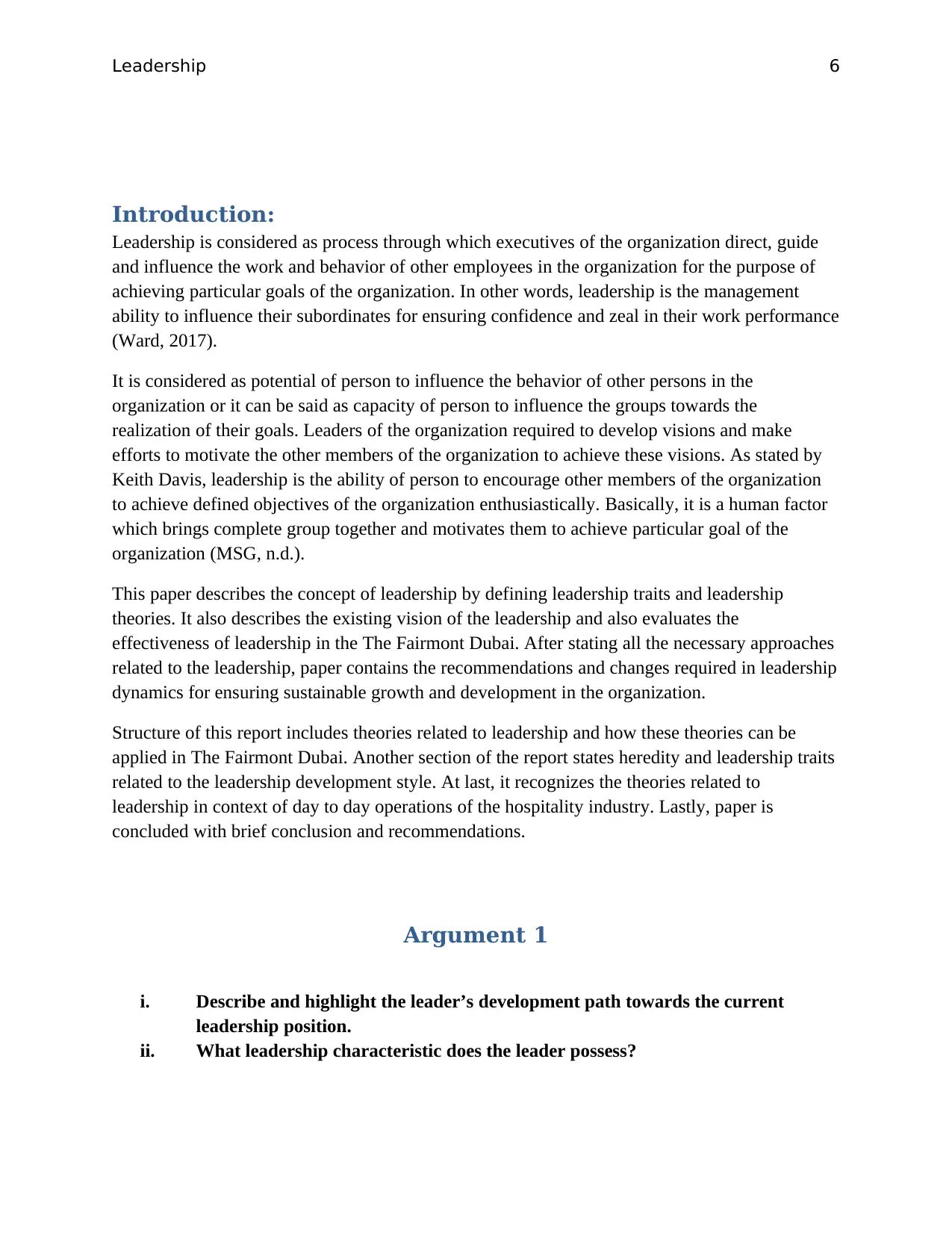
Leadership 6
Introduction:
Leadership is considered as process through which executives of the organization direct, guide
and influence the work and behavior of other employees in the organization for the purpose of
achieving particular goals of the organization. In other words, leadership is the management
ability to influence their subordinates for ensuring confidence and zeal in their work performance
(Ward, 2017).
It is considered as potential of person to influence the behavior of other persons in the
organization or it can be said as capacity of person to influence the groups towards the
realization of their goals. Leaders of the organization required to develop visions and make
efforts to motivate the other members of the organization to achieve these visions. As stated by
Keith Davis, leadership is the ability of person to encourage other members of the organization
to achieve defined objectives of the organization enthusiastically. Basically, it is a human factor
which brings complete group together and motivates them to achieve particular goal of the
organization (MSG, n.d.).
This paper describes the concept of leadership by defining leadership traits and leadership
theories. It also describes the existing vision of the leadership and also evaluates the
effectiveness of leadership in the The Fairmont Dubai. After stating all the necessary approaches
related to the leadership, paper contains the recommendations and changes required in leadership
dynamics for ensuring sustainable growth and development in the organization.
Structure of this report includes theories related to leadership and how these theories can be
applied in The Fairmont Dubai. Another section of the report states heredity and leadership traits
related to the leadership development style. At last, it recognizes the theories related to
leadership in context of day to day operations of the hospitality industry. Lastly, paper is
concluded with brief conclusion and recommendations.
Argument 1
i. Describe and highlight the leader’s development path towards the current
leadership position.
ii. What leadership characteristic does the leader possess?
Introduction:
Leadership is considered as process through which executives of the organization direct, guide
and influence the work and behavior of other employees in the organization for the purpose of
achieving particular goals of the organization. In other words, leadership is the management
ability to influence their subordinates for ensuring confidence and zeal in their work performance
(Ward, 2017).
It is considered as potential of person to influence the behavior of other persons in the
organization or it can be said as capacity of person to influence the groups towards the
realization of their goals. Leaders of the organization required to develop visions and make
efforts to motivate the other members of the organization to achieve these visions. As stated by
Keith Davis, leadership is the ability of person to encourage other members of the organization
to achieve defined objectives of the organization enthusiastically. Basically, it is a human factor
which brings complete group together and motivates them to achieve particular goal of the
organization (MSG, n.d.).
This paper describes the concept of leadership by defining leadership traits and leadership
theories. It also describes the existing vision of the leadership and also evaluates the
effectiveness of leadership in the The Fairmont Dubai. After stating all the necessary approaches
related to the leadership, paper contains the recommendations and changes required in leadership
dynamics for ensuring sustainable growth and development in the organization.
Structure of this report includes theories related to leadership and how these theories can be
applied in The Fairmont Dubai. Another section of the report states heredity and leadership traits
related to the leadership development style. At last, it recognizes the theories related to
leadership in context of day to day operations of the hospitality industry. Lastly, paper is
concluded with brief conclusion and recommendations.
Argument 1
i. Describe and highlight the leader’s development path towards the current
leadership position.
ii. What leadership characteristic does the leader possess?
⊘ This is a preview!⊘
Do you want full access?
Subscribe today to unlock all pages.

Trusted by 1+ million students worldwide
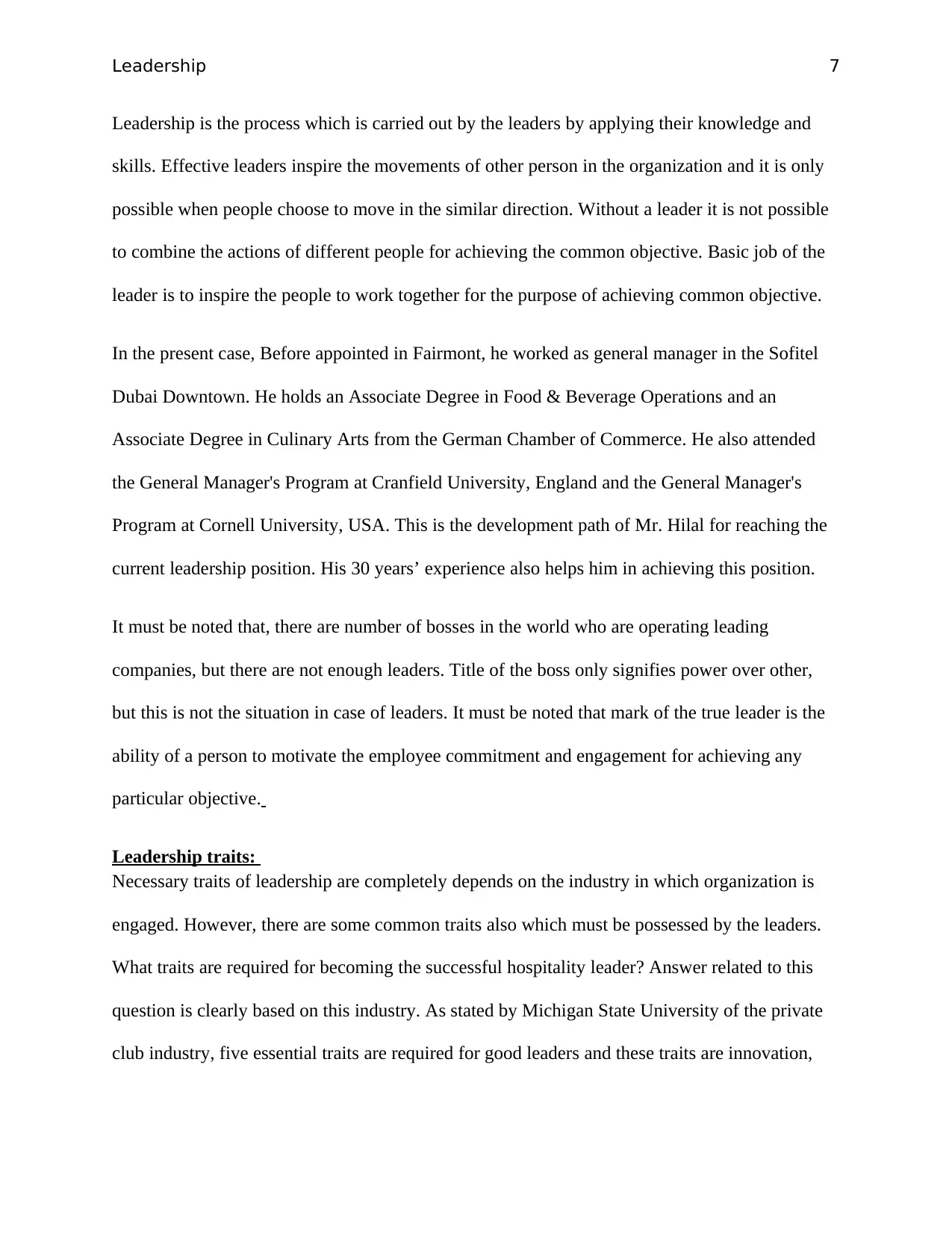
Leadership 7
Leadership is the process which is carried out by the leaders by applying their knowledge and
skills. Effective leaders inspire the movements of other person in the organization and it is only
possible when people choose to move in the similar direction. Without a leader it is not possible
to combine the actions of different people for achieving the common objective. Basic job of the
leader is to inspire the people to work together for the purpose of achieving common objective.
In the present case, Before appointed in Fairmont, he worked as general manager in the Sofitel
Dubai Downtown. He holds an Associate Degree in Food & Beverage Operations and an
Associate Degree in Culinary Arts from the German Chamber of Commerce. He also attended
the General Manager's Program at Cranfield University, England and the General Manager's
Program at Cornell University, USA. This is the development path of Mr. Hilal for reaching the
current leadership position. His 30 years’ experience also helps him in achieving this position.
It must be noted that, there are number of bosses in the world who are operating leading
companies, but there are not enough leaders. Title of the boss only signifies power over other,
but this is not the situation in case of leaders. It must be noted that mark of the true leader is the
ability of a person to motivate the employee commitment and engagement for achieving any
particular objective.
Leadership traits:
Necessary traits of leadership are completely depends on the industry in which organization is
engaged. However, there are some common traits also which must be possessed by the leaders.
What traits are required for becoming the successful hospitality leader? Answer related to this
question is clearly based on this industry. As stated by Michigan State University of the private
club industry, five essential traits are required for good leaders and these traits are innovation,
Leadership is the process which is carried out by the leaders by applying their knowledge and
skills. Effective leaders inspire the movements of other person in the organization and it is only
possible when people choose to move in the similar direction. Without a leader it is not possible
to combine the actions of different people for achieving the common objective. Basic job of the
leader is to inspire the people to work together for the purpose of achieving common objective.
In the present case, Before appointed in Fairmont, he worked as general manager in the Sofitel
Dubai Downtown. He holds an Associate Degree in Food & Beverage Operations and an
Associate Degree in Culinary Arts from the German Chamber of Commerce. He also attended
the General Manager's Program at Cranfield University, England and the General Manager's
Program at Cornell University, USA. This is the development path of Mr. Hilal for reaching the
current leadership position. His 30 years’ experience also helps him in achieving this position.
It must be noted that, there are number of bosses in the world who are operating leading
companies, but there are not enough leaders. Title of the boss only signifies power over other,
but this is not the situation in case of leaders. It must be noted that mark of the true leader is the
ability of a person to motivate the employee commitment and engagement for achieving any
particular objective.
Leadership traits:
Necessary traits of leadership are completely depends on the industry in which organization is
engaged. However, there are some common traits also which must be possessed by the leaders.
What traits are required for becoming the successful hospitality leader? Answer related to this
question is clearly based on this industry. As stated by Michigan State University of the private
club industry, five essential traits are required for good leaders and these traits are innovation,
Paraphrase This Document
Need a fresh take? Get an instant paraphrase of this document with our AI Paraphraser
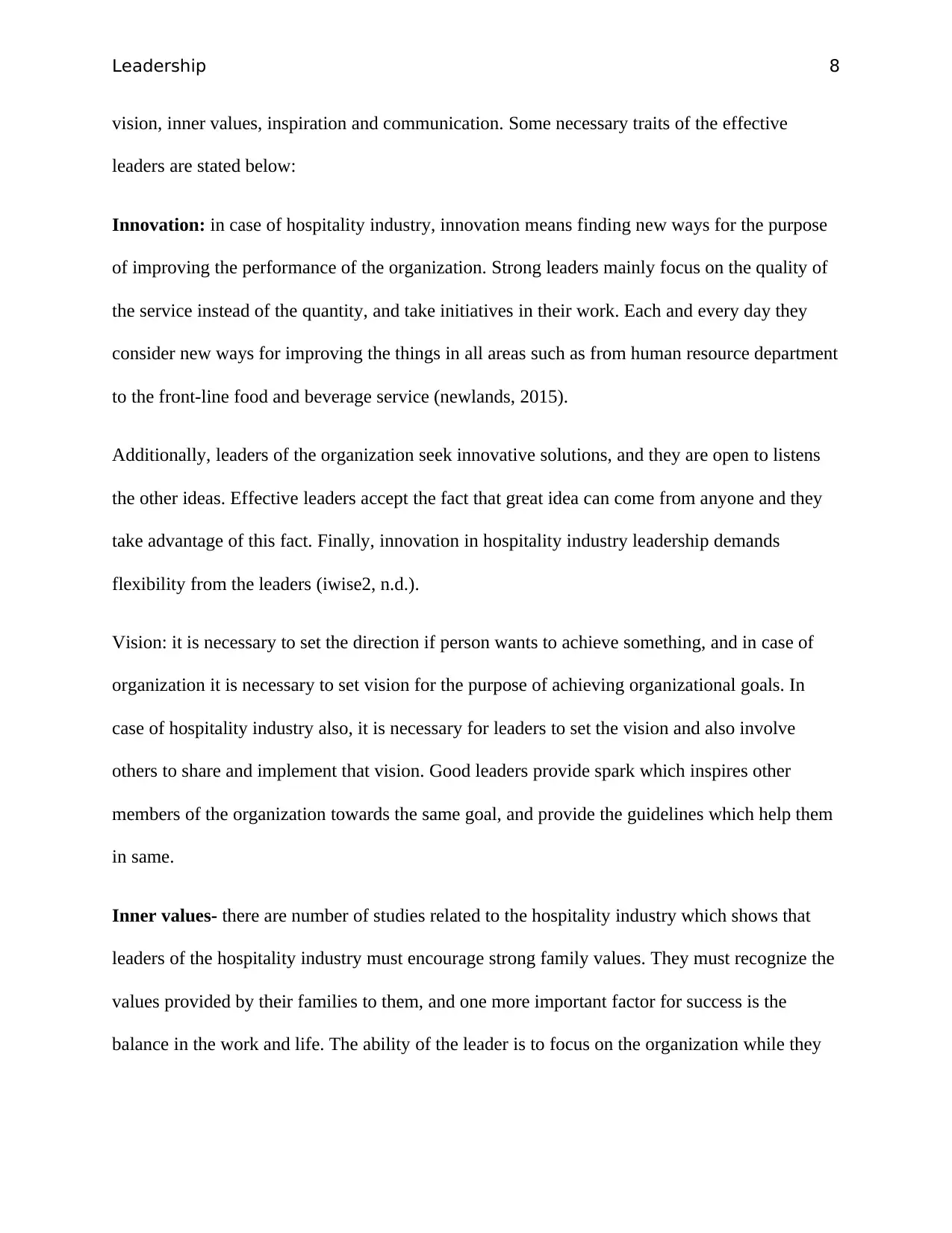
Leadership 8
vision, inner values, inspiration and communication. Some necessary traits of the effective
leaders are stated below:
Innovation: in case of hospitality industry, innovation means finding new ways for the purpose
of improving the performance of the organization. Strong leaders mainly focus on the quality of
the service instead of the quantity, and take initiatives in their work. Each and every day they
consider new ways for improving the things in all areas such as from human resource department
to the front-line food and beverage service (newlands, 2015).
Additionally, leaders of the organization seek innovative solutions, and they are open to listens
the other ideas. Effective leaders accept the fact that great idea can come from anyone and they
take advantage of this fact. Finally, innovation in hospitality industry leadership demands
flexibility from the leaders (iwise2, n.d.).
Vision: it is necessary to set the direction if person wants to achieve something, and in case of
organization it is necessary to set vision for the purpose of achieving organizational goals. In
case of hospitality industry also, it is necessary for leaders to set the vision and also involve
others to share and implement that vision. Good leaders provide spark which inspires other
members of the organization towards the same goal, and provide the guidelines which help them
in same.
Inner values- there are number of studies related to the hospitality industry which shows that
leaders of the hospitality industry must encourage strong family values. They must recognize the
values provided by their families to them, and one more important factor for success is the
balance in the work and life. The ability of the leader is to focus on the organization while they
vision, inner values, inspiration and communication. Some necessary traits of the effective
leaders are stated below:
Innovation: in case of hospitality industry, innovation means finding new ways for the purpose
of improving the performance of the organization. Strong leaders mainly focus on the quality of
the service instead of the quantity, and take initiatives in their work. Each and every day they
consider new ways for improving the things in all areas such as from human resource department
to the front-line food and beverage service (newlands, 2015).
Additionally, leaders of the organization seek innovative solutions, and they are open to listens
the other ideas. Effective leaders accept the fact that great idea can come from anyone and they
take advantage of this fact. Finally, innovation in hospitality industry leadership demands
flexibility from the leaders (iwise2, n.d.).
Vision: it is necessary to set the direction if person wants to achieve something, and in case of
organization it is necessary to set vision for the purpose of achieving organizational goals. In
case of hospitality industry also, it is necessary for leaders to set the vision and also involve
others to share and implement that vision. Good leaders provide spark which inspires other
members of the organization towards the same goal, and provide the guidelines which help them
in same.
Inner values- there are number of studies related to the hospitality industry which shows that
leaders of the hospitality industry must encourage strong family values. They must recognize the
values provided by their families to them, and one more important factor for success is the
balance in the work and life. The ability of the leader is to focus on the organization while they
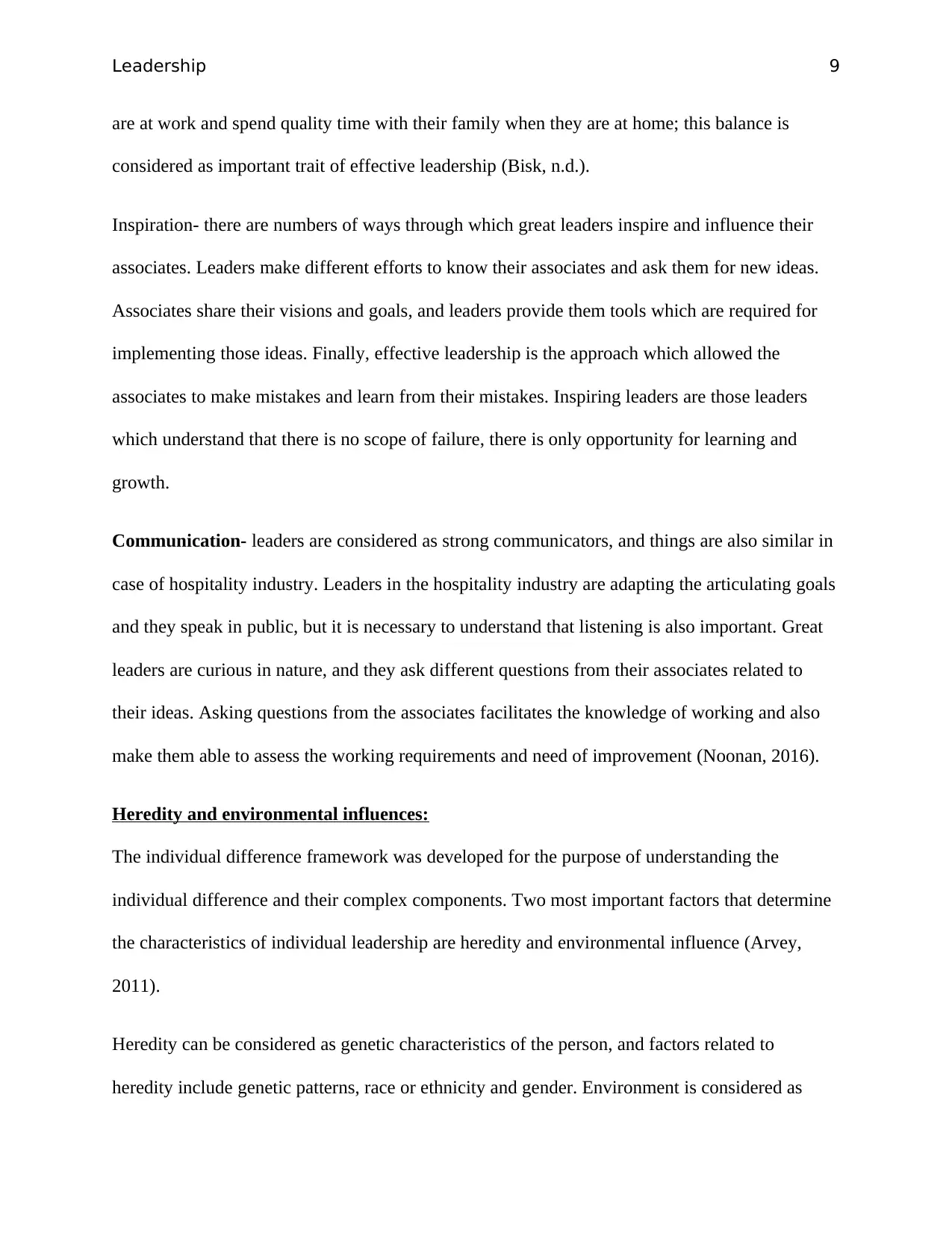
Leadership 9
are at work and spend quality time with their family when they are at home; this balance is
considered as important trait of effective leadership (Bisk, n.d.).
Inspiration- there are numbers of ways through which great leaders inspire and influence their
associates. Leaders make different efforts to know their associates and ask them for new ideas.
Associates share their visions and goals, and leaders provide them tools which are required for
implementing those ideas. Finally, effective leadership is the approach which allowed the
associates to make mistakes and learn from their mistakes. Inspiring leaders are those leaders
which understand that there is no scope of failure, there is only opportunity for learning and
growth.
Communication- leaders are considered as strong communicators, and things are also similar in
case of hospitality industry. Leaders in the hospitality industry are adapting the articulating goals
and they speak in public, but it is necessary to understand that listening is also important. Great
leaders are curious in nature, and they ask different questions from their associates related to
their ideas. Asking questions from the associates facilitates the knowledge of working and also
make them able to assess the working requirements and need of improvement (Noonan, 2016).
Heredity and environmental influences:
The individual difference framework was developed for the purpose of understanding the
individual difference and their complex components. Two most important factors that determine
the characteristics of individual leadership are heredity and environmental influence (Arvey,
2011).
Heredity can be considered as genetic characteristics of the person, and factors related to
heredity include genetic patterns, race or ethnicity and gender. Environment is considered as
are at work and spend quality time with their family when they are at home; this balance is
considered as important trait of effective leadership (Bisk, n.d.).
Inspiration- there are numbers of ways through which great leaders inspire and influence their
associates. Leaders make different efforts to know their associates and ask them for new ideas.
Associates share their visions and goals, and leaders provide them tools which are required for
implementing those ideas. Finally, effective leadership is the approach which allowed the
associates to make mistakes and learn from their mistakes. Inspiring leaders are those leaders
which understand that there is no scope of failure, there is only opportunity for learning and
growth.
Communication- leaders are considered as strong communicators, and things are also similar in
case of hospitality industry. Leaders in the hospitality industry are adapting the articulating goals
and they speak in public, but it is necessary to understand that listening is also important. Great
leaders are curious in nature, and they ask different questions from their associates related to
their ideas. Asking questions from the associates facilitates the knowledge of working and also
make them able to assess the working requirements and need of improvement (Noonan, 2016).
Heredity and environmental influences:
The individual difference framework was developed for the purpose of understanding the
individual difference and their complex components. Two most important factors that determine
the characteristics of individual leadership are heredity and environmental influence (Arvey,
2011).
Heredity can be considered as genetic characteristics of the person, and factors related to
heredity include genetic patterns, race or ethnicity and gender. Environment is considered as
⊘ This is a preview!⊘
Do you want full access?
Subscribe today to unlock all pages.

Trusted by 1+ million students worldwide
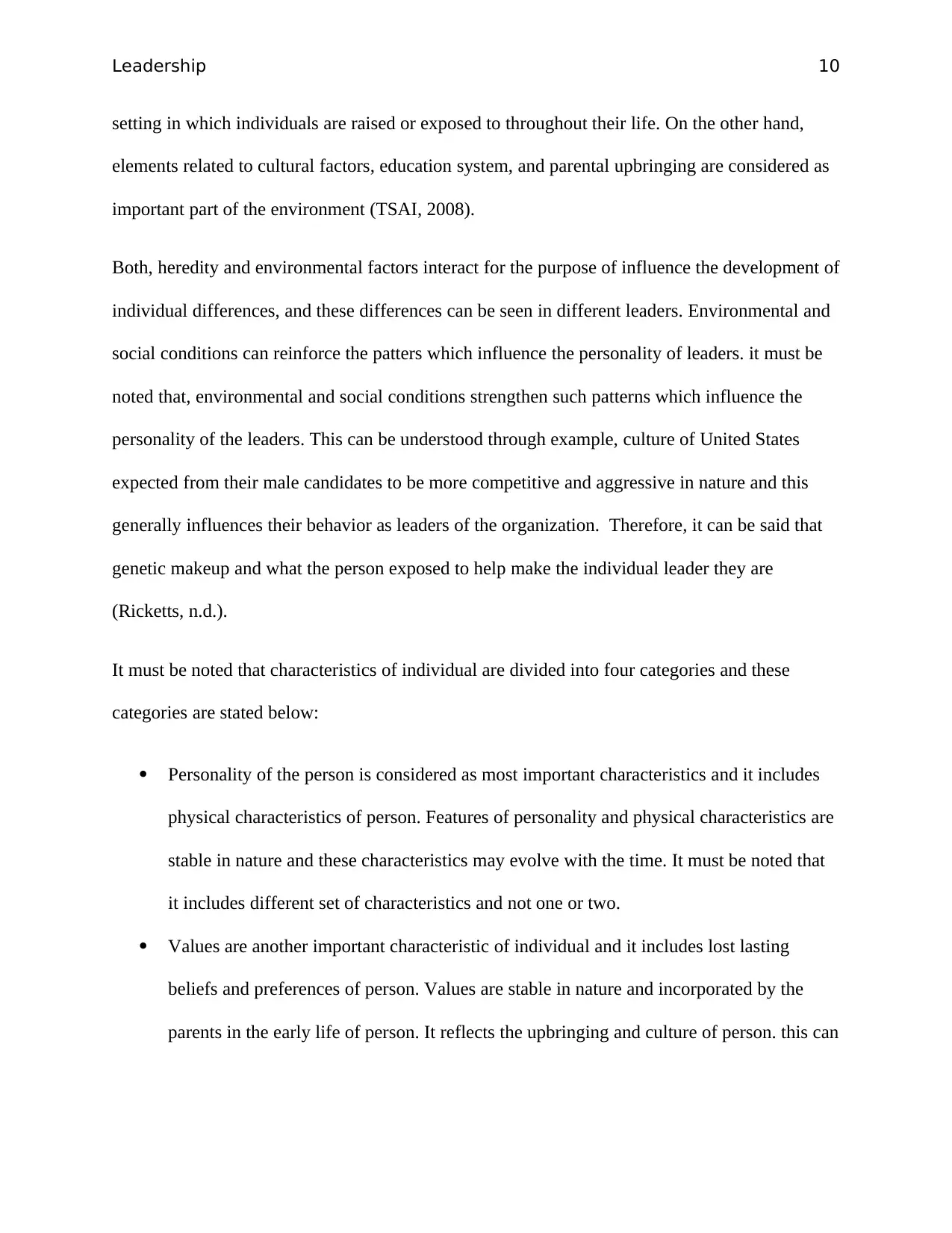
Leadership 10
setting in which individuals are raised or exposed to throughout their life. On the other hand,
elements related to cultural factors, education system, and parental upbringing are considered as
important part of the environment (TSAI, 2008).
Both, heredity and environmental factors interact for the purpose of influence the development of
individual differences, and these differences can be seen in different leaders. Environmental and
social conditions can reinforce the patters which influence the personality of leaders. it must be
noted that, environmental and social conditions strengthen such patterns which influence the
personality of the leaders. This can be understood through example, culture of United States
expected from their male candidates to be more competitive and aggressive in nature and this
generally influences their behavior as leaders of the organization. Therefore, it can be said that
genetic makeup and what the person exposed to help make the individual leader they are
(Ricketts, n.d.).
It must be noted that characteristics of individual are divided into four categories and these
categories are stated below:
Personality of the person is considered as most important characteristics and it includes
physical characteristics of person. Features of personality and physical characteristics are
stable in nature and these characteristics may evolve with the time. It must be noted that
it includes different set of characteristics and not one or two.
Values are another important characteristic of individual and it includes lost lasting
beliefs and preferences of person. Values are stable in nature and incorporated by the
parents in the early life of person. It reflects the upbringing and culture of person. this can
setting in which individuals are raised or exposed to throughout their life. On the other hand,
elements related to cultural factors, education system, and parental upbringing are considered as
important part of the environment (TSAI, 2008).
Both, heredity and environmental factors interact for the purpose of influence the development of
individual differences, and these differences can be seen in different leaders. Environmental and
social conditions can reinforce the patters which influence the personality of leaders. it must be
noted that, environmental and social conditions strengthen such patterns which influence the
personality of the leaders. This can be understood through example, culture of United States
expected from their male candidates to be more competitive and aggressive in nature and this
generally influences their behavior as leaders of the organization. Therefore, it can be said that
genetic makeup and what the person exposed to help make the individual leader they are
(Ricketts, n.d.).
It must be noted that characteristics of individual are divided into four categories and these
categories are stated below:
Personality of the person is considered as most important characteristics and it includes
physical characteristics of person. Features of personality and physical characteristics are
stable in nature and these characteristics may evolve with the time. It must be noted that
it includes different set of characteristics and not one or two.
Values are another important characteristic of individual and it includes lost lasting
beliefs and preferences of person. Values are stable in nature and incorporated by the
parents in the early life of person. It reflects the upbringing and culture of person. this can
Paraphrase This Document
Need a fresh take? Get an instant paraphrase of this document with our AI Paraphraser
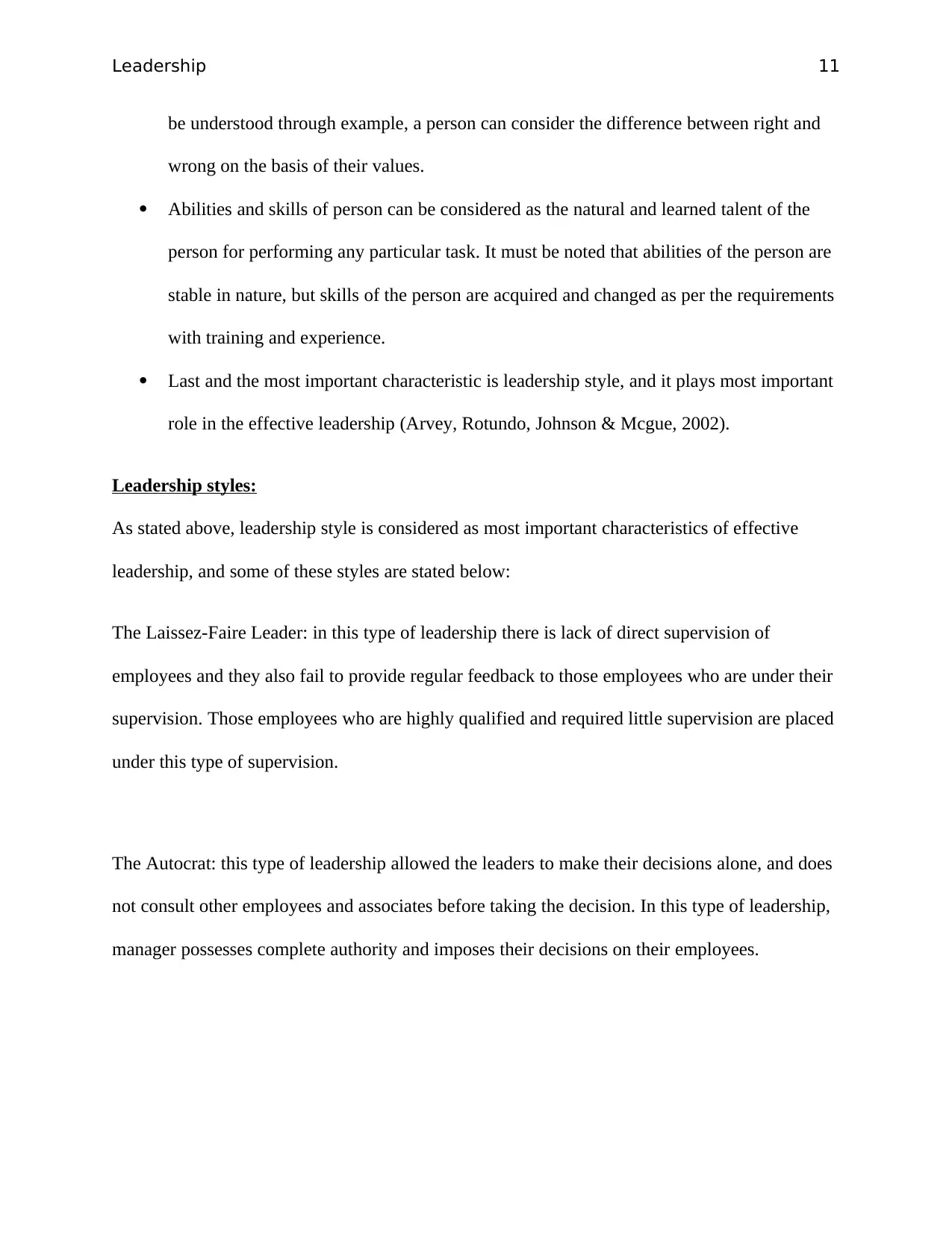
Leadership 11
be understood through example, a person can consider the difference between right and
wrong on the basis of their values.
Abilities and skills of person can be considered as the natural and learned talent of the
person for performing any particular task. It must be noted that abilities of the person are
stable in nature, but skills of the person are acquired and changed as per the requirements
with training and experience.
Last and the most important characteristic is leadership style, and it plays most important
role in the effective leadership (Arvey, Rotundo, Johnson & Mcgue, 2002).
Leadership styles:
As stated above, leadership style is considered as most important characteristics of effective
leadership, and some of these styles are stated below:
The Laissez-Faire Leader: in this type of leadership there is lack of direct supervision of
employees and they also fail to provide regular feedback to those employees who are under their
supervision. Those employees who are highly qualified and required little supervision are placed
under this type of supervision.
The Autocrat: this type of leadership allowed the leaders to make their decisions alone, and does
not consult other employees and associates before taking the decision. In this type of leadership,
manager possesses complete authority and imposes their decisions on their employees.
be understood through example, a person can consider the difference between right and
wrong on the basis of their values.
Abilities and skills of person can be considered as the natural and learned talent of the
person for performing any particular task. It must be noted that abilities of the person are
stable in nature, but skills of the person are acquired and changed as per the requirements
with training and experience.
Last and the most important characteristic is leadership style, and it plays most important
role in the effective leadership (Arvey, Rotundo, Johnson & Mcgue, 2002).
Leadership styles:
As stated above, leadership style is considered as most important characteristics of effective
leadership, and some of these styles are stated below:
The Laissez-Faire Leader: in this type of leadership there is lack of direct supervision of
employees and they also fail to provide regular feedback to those employees who are under their
supervision. Those employees who are highly qualified and required little supervision are placed
under this type of supervision.
The Autocrat: this type of leadership allowed the leaders to make their decisions alone, and does
not consult other employees and associates before taking the decision. In this type of leadership,
manager possesses complete authority and imposes their decisions on their employees.
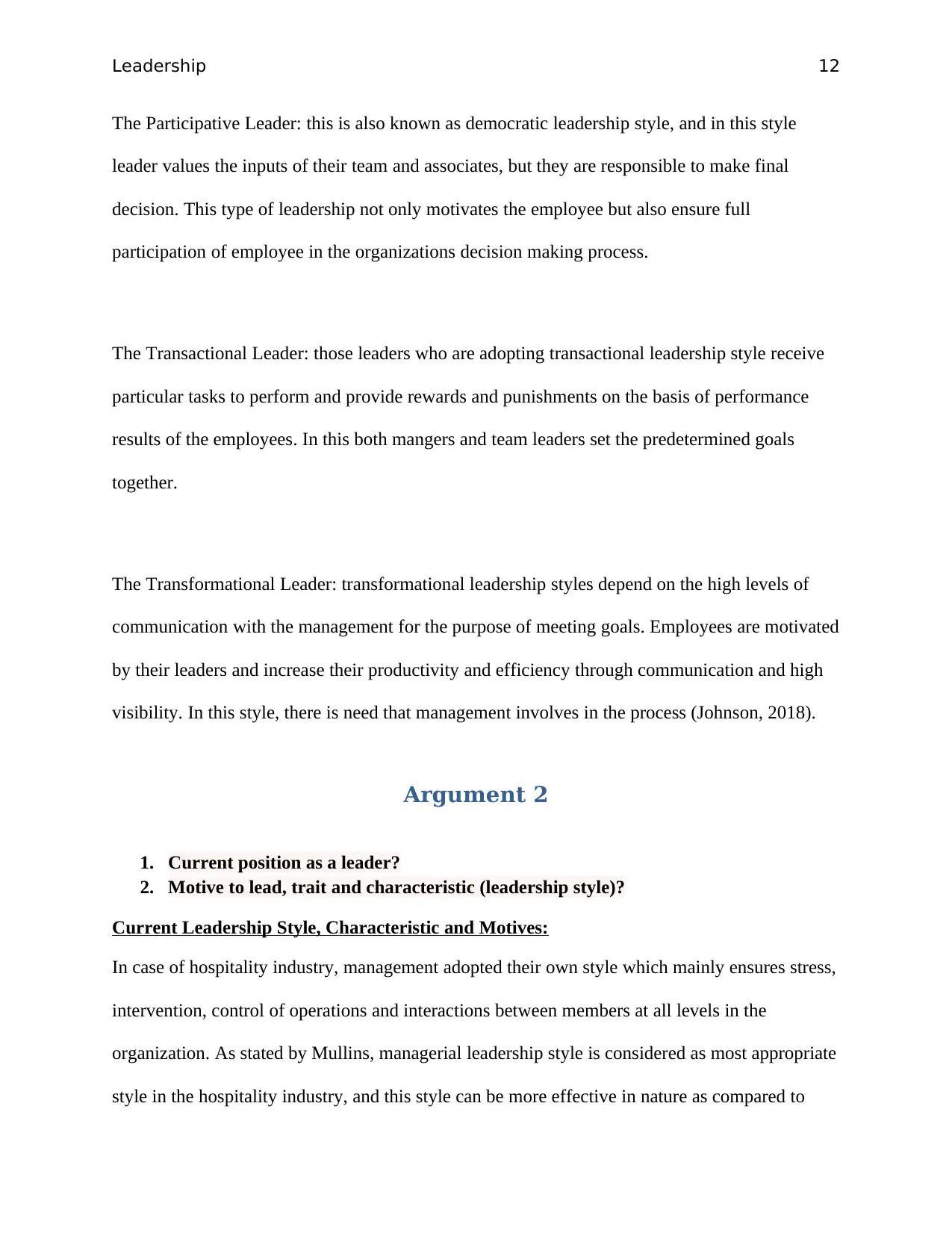
Leadership 12
The Participative Leader: this is also known as democratic leadership style, and in this style
leader values the inputs of their team and associates, but they are responsible to make final
decision. This type of leadership not only motivates the employee but also ensure full
participation of employee in the organizations decision making process.
The Transactional Leader: those leaders who are adopting transactional leadership style receive
particular tasks to perform and provide rewards and punishments on the basis of performance
results of the employees. In this both mangers and team leaders set the predetermined goals
together.
The Transformational Leader: transformational leadership styles depend on the high levels of
communication with the management for the purpose of meeting goals. Employees are motivated
by their leaders and increase their productivity and efficiency through communication and high
visibility. In this style, there is need that management involves in the process (Johnson, 2018).
Argument 2
1. Current position as a leader?
2. Motive to lead, trait and characteristic (leadership style)?
Current Leadership Style, Characteristic and Motives:
In case of hospitality industry, management adopted their own style which mainly ensures stress,
intervention, control of operations and interactions between members at all levels in the
organization. As stated by Mullins, managerial leadership style is considered as most appropriate
style in the hospitality industry, and this style can be more effective in nature as compared to
The Participative Leader: this is also known as democratic leadership style, and in this style
leader values the inputs of their team and associates, but they are responsible to make final
decision. This type of leadership not only motivates the employee but also ensure full
participation of employee in the organizations decision making process.
The Transactional Leader: those leaders who are adopting transactional leadership style receive
particular tasks to perform and provide rewards and punishments on the basis of performance
results of the employees. In this both mangers and team leaders set the predetermined goals
together.
The Transformational Leader: transformational leadership styles depend on the high levels of
communication with the management for the purpose of meeting goals. Employees are motivated
by their leaders and increase their productivity and efficiency through communication and high
visibility. In this style, there is need that management involves in the process (Johnson, 2018).
Argument 2
1. Current position as a leader?
2. Motive to lead, trait and characteristic (leadership style)?
Current Leadership Style, Characteristic and Motives:
In case of hospitality industry, management adopted their own style which mainly ensures stress,
intervention, control of operations and interactions between members at all levels in the
organization. As stated by Mullins, managerial leadership style is considered as most appropriate
style in the hospitality industry, and this style can be more effective in nature as compared to
⊘ This is a preview!⊘
Do you want full access?
Subscribe today to unlock all pages.

Trusted by 1+ million students worldwide
1 out of 17
Your All-in-One AI-Powered Toolkit for Academic Success.
+13062052269
info@desklib.com
Available 24*7 on WhatsApp / Email
![[object Object]](/_next/static/media/star-bottom.7253800d.svg)
Unlock your academic potential
Copyright © 2020–2025 A2Z Services. All Rights Reserved. Developed and managed by ZUCOL.
